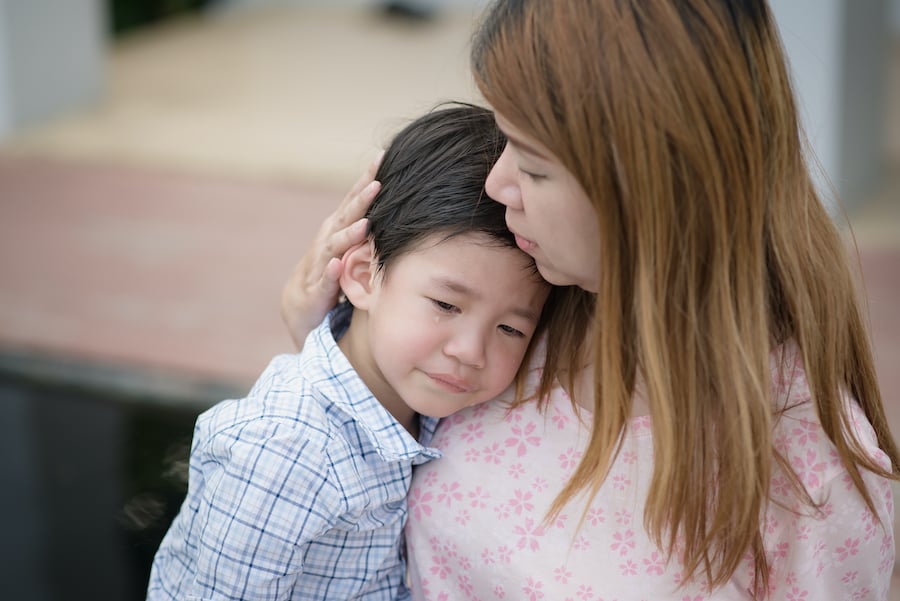Empathetic Parenting: Raising a Compassionate and Confident Child
Empathy is a powerful quality, especially in parenting. It creates connection, calms the nervous system, and helps children build the emotional skills they’ll carry into every relationship throughout life.
Empathetic parenting is more than just understanding your child’s feelings – it’s a conscious choice to respond with presence, compassion, and respect, especially during the most challenging moments.

Empathy (n): the capacity to understand or feel what another is experiencing within a frame of reference, the capacity to place one’s self in another’s position.
Empathetic Parenting and Why It’s Important
When we apply empathy to parenting, we recognize our child’s feelings and emotions. Children, toddlers and preschoolers in particular, are extremely emotional. Their worlds are very small, so it makes sense that what seems minor to us is major to them.
Parents can often minimize or downplay their young child’s emotions because they don’t understand the intensity of them.
Empathy is the antidote to shame.
– Brene Brown
Empathy is what’s needed when a child feels bad, struggles emotionally, or has made a mistake.
What children don’t need in those moments is additional shame tacked on to their mistakes and unpleasant feelings to make them feel worse or unlovable.
What children do need is empathy to see them through those moments.
Empathy to reinforce your relationship.
Empathy to help regulate brain chemistry; to assure a child, “The way you feel is normal. You’re normal.”
Empathy to provide validation. “You have a right to feel that way.”
Empathy to help a child get on the road to self-acceptance and self-love. “You may have made a mistake, but you are not a mistake.”
Here are five things you can do that will help you respond to a hurting child with empathy:
1. Take your child’s perspective
See the world through their eyes. Their problems might seem trivial to you, but try to see them as they do. Broken crayons, lost toys, stuck zippers, or nightly clean-up time mean more to your child than they do to you.
2. Refrain from judgment
Yes, you may disagree with your child. You may think they were “wrong” for what they did, said, or felt during the conflict they had at school that day, but put that aside for now. Your child doesn’t need your judgment, they need to be able to impart their own judgment. Help them do that by focusing on their feelings regarding what happened.
You can circle back later with reflection or guidance. But first, focus on helping your child process what happened from their perspective. That’s what teaches self-awareness and accountability — not shame.
3. Communicate your understanding of your child’s feelings
This can be a glance, a nod, a knowing look. It’s kindness in the eyes and an “I get it” arm-wrap. It can be words, sure, but above all it’s a message.
It’s a message that you understand because you’ve also had similar moments and similar feelings. Let them know you are here as their equal in this moment.
4. Pause Before You Say “But…”
“Yes, you got into an argument with your friend. That happens. He got angry; your feelings were hurt. You’re very upset. BUT, you still should not have hit him…BUT that’s no reason to quit the game…BUT you need to learn how to control your temper.”
It’s that last part that needs leaving off. That’s not part of empathy.
Empathy and empathetic parenting is just sitting with the feelings for a bit. That might be really hard! It might feel unfinished. It might feel awkward to stop at, “You were really embarrassed.” and not add on some kind of resolution or suggestion. Don’t go there though…not yet.
5. Instead, try AND
After a period of empathic listening and probably plenty of tears, you can move on.
“…and your friend got hurt.”
“…and now what should we do?”
“…and what if this happens again?”
“…and is there something that will help you in the future?”
“…and is there a way to fix this mistake?”
“…and is there a way I can help you?”
Only after you have helped your child process their feelings through validation and understanding will they be able to move on to problem solving and the “what-to-do-now”s.
Empathetic Parenting in Real Life
Here are a few examples of what empathy might look like at different ages:
- Toddler tantrum: “You really wanted the blue cup. It’s hard when things don’t go the way you want.”
- Preschool hitting: “You were frustrated your tower got knocked over. I won’t let you hit — let’s find another way to show those big feelings.”
- School-age sibling fight: “You were trying to feel included. That didn’t go how you hoped, huh?”
- Tween door slam: “You needed space. Let’s talk when you’re ready.”
When we raise our children with regular expressions of empathy, they will learn through experience just what empathy looks like, sounds like, and feels like, and they will, in turn be able to give it to others.
Empathetic parenting is not just a belief, but a concept you have to model and put into practice so that your child will truly develop empathy themselves.

